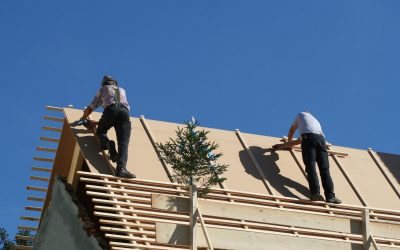Did you know that in order to keep your roof warranty in effect, you typically must have it inspected by a licensed roofing contractor or similar roofing professional each year? Modern roofing systems incorporate a combination of various roofing components and installation methods, so it only makes sense that all roof inspections should be conducted by a licensed contractor. Ideally, a commercial roof should undergo two inspections each year, one in the spring and one in the late fall, while a residential roof should be inspected at least once per year. Ideally, the licensed contractor who originally installed the roof should be contacted for an inspection a minimum of once each year if the roof is under warranty. When is the last time you had your roof inspected for faulty components or shingles or any general roof repair issues?
Why Are Roof Inspections Necessary?
In order to achieve maximum service life and performance, all roofs should be subjected to periodic roof inspection and maintenance, and it actually isn’t uncommon for a roofing material manufacturer or roofing installer to require such roof inspection and maintenance to keep the manufacturer’s and installer’s warranties in effect. While all building owners and homeowners should implement a periodic roof inspection, due to the complexity of modern roofing and the physical risk that is involved, inspection, maintenance, and roof repair on any roof should be undertaken only by qualified professionals who have been trained in and are familiar with safe roofing practices and inspection techniques. Roof inspections will identify key issues and components that require repair or replacement in order to ensure that the total roofing system will perform as it was designed and remain serviceable for as long as it was designed to perform.
Roofing Maintenance and Repairs
Your periodic roofing inspection is sure to identify something that needs attention, whether it be loose, cracked, or missing shingles; shingles that are too worn to be serviceable; flashing that has come loose or flashing sealants that have deteriorated; or gutters that have been damaged or unsecured. If the slope of your roof allows it and you are comfortable, you may want to consider joining the inspector to gain some first-hand knowledge on the subject and ask any questions that you may have. Your inspector can itemize recommended repairs for you, explain their necessity, and respond to your concerns. It’s important to get any needed repairs scheduled immediately as a poorly functioning roof, flashing, or gutters poses a threat to the building and its interior components, finishes, and owner’s belongings. Owners too often leave their roofing off of the regular building or home maintenance list simply because a complete roof is a complex system, but if you want to ensure that your roof will get the attention it needs, schedule a regular inspection with a qualified roofing contractor such as John Bean Roofing. You can also follow them on Twitter for more updates.



